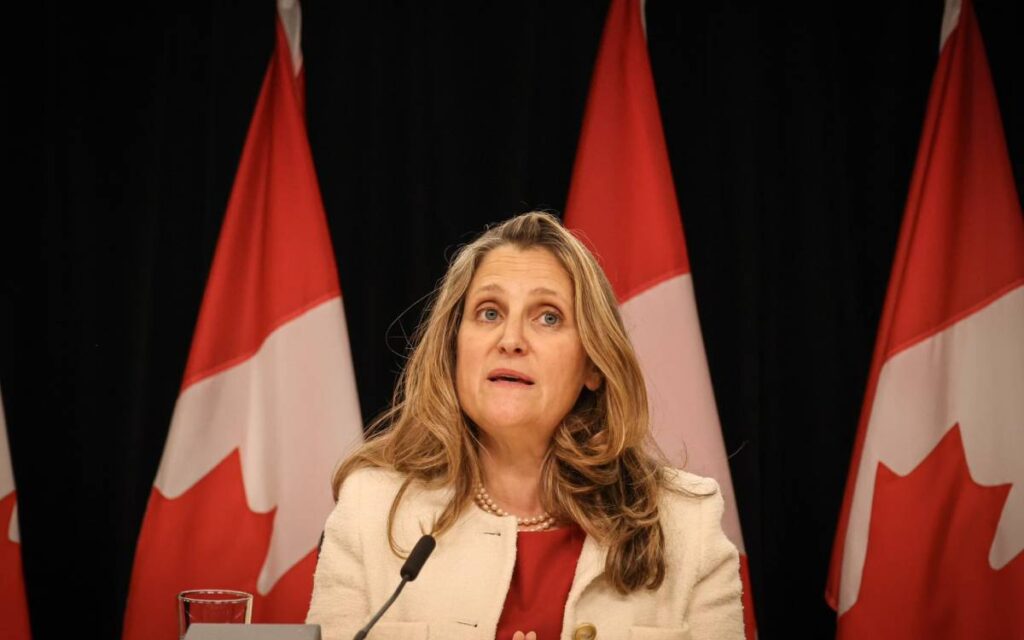
Freeland’s resignation has also intensified questions about Trudeau’s leadership. Pictured: University-Rosedale MP Chrystia Freeland. Photo Credit: Chrystia Freeland/X.
In a political earthquake that shook Ottawa, Chrystia Freeland, now former deputy prime minister and finance minister, abruptly resigned just hours before she was to deliver the long-delayed Fall Economic Statement (FES). Her unexpected departure has thrown Prime Minister Justin Trudeau’s leadership into question and ignited calls for a snap election from opposition leaders and those inside the Liberal Party.
Freeland, once regarded as Trudeau’s most loyal lieutenant, stepped down Monday morning, citing irreconcilable differences over the economic direction of the government. In a sharply worded resignation letter posted on X, she criticized Trudeau for pursuing “political gimmicks” instead of fiscal discipline. The resignation followed reports of escalating tensions between Freeland and Trudeau over the rising deficit and controversial measures such as a GST rebate and a $250 cost-of-living cheque for Canadians.
Her decision to leave came amid growing discontent within the Liberal caucus. Over 45 Liberal MPs have now called for Trudeau’s resignation, doubling the number of dissenters in recent weeks. Adding to the chaos, Housing Minister Sean Fraser also announced his departure on Monday, citing family obligations. His resignation compounds an exodus of senior Liberal ministers ahead of the 2025 federal election, further destabilizing Trudeau’s front bench.
Despite the turmoil, the Fall Economic Statement was tabled later that day by Government House Leader Karina Gould. The fiscal update painted a stark picture of Canada’s economic health, revealing a $61.9 billion deficit for 2023-24—far exceeding the $40 billion projection made in the spring budget. Freeland had reportedly opposed the increase, arguing for fiscal prudence in light of economic uncertainties and the looming threat of a trade war with the United States.
The statement included significant commitments aimed at border security, innovation, and economic competitiveness. To address President-elect Donald Trump’s proposed tariffs, $1.3 billion was allocated to strengthen Canada’s borders over six years. The government also unveiled reforms to the SR&ED tax credit, unlocking $26 billion in incentives for Canadian businesses, alongside new measures supporting AI investments and housing initiatives. These programs appeared aimed at countering inflation concerns and boosting economic resilience, but opposition leaders dismissed the spending as further evidence of Liberal disarray.
Conservative Leader Pierre Poilievre described the Liberal government as “spiraling out of control,” adding that Trudeau had “lost control” of both his party and the country. Bloc Québécois Leader Yves-François Blanchet went a step further, demanding a snap election to address what he described as fiscal mismanagement and Canada’s lack of preparedness for Trump’s economic agenda.
Freeland’s resignation has also intensified questions about Trudeau’s leadership. During an emergency caucus meeting Monday evening, prominent Liberal MPs, including Chad Collins and Anthony Housefather, publicly called for Trudeau to step down, arguing that the party needs new leadership and a fresh vision to remain competitive. Collins described the situation as untenable, warning that without change, the Liberals risk further alienating voters.
In the immediate aftermath, Trudeau appointed Public Safety Minister Dominic LeBlanc as Canada’s new finance minister. LeBlanc, a close Trudeau ally, will continue to hold his existing responsibilities alongside his new role, an unprecedented workload that underscores the government’s diminished talent pool. Despite the appointment, speculation remains that former Bank of Canada governor Mark Carney is being positioned as Trudeau’s eventual replacement.
With Parliament set to break for five weeks, Trudeau’s next steps remain uncertain. He must quell discontent within his party, address plummeting polls, and convince the NDP to maintain its support for his minority government. NDP Leader Jagmeet Singh, while joining calls for Trudeau’s resignation, stopped short of withdrawing his party’s backing, stating that “all options remain on the table.”
As Canada faces mounting economic uncertainty and political instability, Trudeau’s leadership hangs in the balance. With Trump’s tariff threats looming and opposition parties pressing for an election, the new year promises to be a defining moment for the Liberal government and Canadian politics.

Daniel Perry is the Director of Federal Affairs at the Council of Canadian Innovators, leading national advocacy and engagement efforts. With experience in consulting and roles at the Senate of Canada, Queen’s Park, and the Canadian Criminal Justice Association, Daniel has helped political leaders and clients across various sectors achieve their public policy goals. A frequent media contributor and seasoned campaigner, Daniel holds a Master of Political Management from Carleton University.








